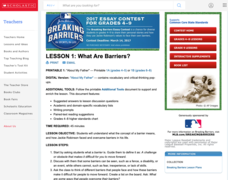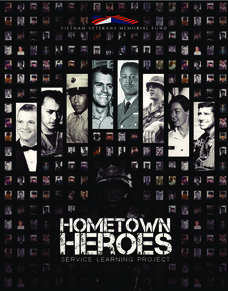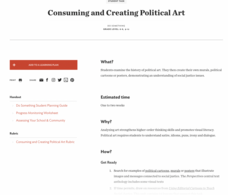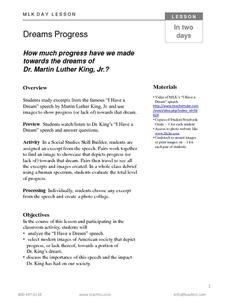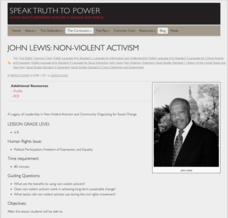Scholastic
Lesson 1: What Are Barriers?
Scholars discuss the concept of a barrier with a short passage on Jackie Robinson. The writing process begins with a paragraph and several other sentences about Robinson's unique traits that made breaking a barrier possible.
Anti-Defamation League
Pink Collar Jobs: Gender Segregation and Pay Inequality in the Workplace
Cartoons showing women in the workplace spark a discussion about being a business executive and claiming the corporate ladder. Small groups analyze data and create graphs that display essential information from the handouts. The class...
Federal Reserve Bank
Ten Mile Day
Get your class working on the railroad with this detailed and interactive lesson. After reading and discussing Ten Mile Day, learners explore division of labor, human capital, and productivity with a hands-on group activity in which they...
Smithsonian Institution
POWs
Why did Vietnam POWs and their families receive more media attention than POWs in previous wars? To answer this question, class members view artifacts, read articles, and engage in class discussion. Individuals then assume the voice of...
Vietnam Veterans Memorial Fund
Hometown Heroes
Transform studying about veterans in a textbook to personal interviews with veterans in the community. Four varying lesson plans make up an entire unit or individualized learning based on your class's needs. Exercises include researching...
Museum of Tolerance
Where Do Our Families Come From?
After a grand conversation about immigration to the United States, scholars interview a family member to learn about their journey to America. They then take their new-found knowledge and apply their findings to tracking their family...
Teaching Tolerance
Community Arts Showcase
An art showcase encourages class members to explore the themes of social justice and tolerance. They create an original artwork, engage in group discussions, and journal writing. The art gallery also provides a chance for families and...
Teaching Tolerance
Consuming and Creating Political Art
A picture is worth a thousand words, but political art may be worth even more! After examining examples of political cartoons, murals, and other forms of public art, class members create their own pieces to reflect their ideals and...
Curated OER
This Ain't No Tea Party!
Create food-safe bowls with your class, then organize a meal for the community using the class's bowls to serve. This lesson is based on the Empty Bowels Project, where school kids gain an understanding of global hunger through community...
Canadian Civil Liberties Education Trust
That’s Not Fair!
As part of a series of critical thinking exercises, kids consider issues of social justice, especially the factors that must be considered when trying to balance conflicting rights and freedoms.
Albert Shanker Institute
Who Was Bayard Rustin?
Who was Bayard Rustin? Pupils analyze a series of primary source documents to learn about this important figure in the civil rights movement. The lesson contains a short film to watch along with guiding questions and other resources...
US Citizenship and Immigration Services
Thanksgiving 3—Traditions
Thanksgiving is a treasured national holiday, but it can look different from table to table. Through a reading passage, real-world images, and class discussion, scholars take a look into Thanksgiving's importance to the United States of...
Scholastic
Pilgrim and Wampanoag Daily Life for Grades 6–8
Two slide shows, viewed side-by-side, permit middle schoolers to compare and contrast the lives of the Pilgrims of the Plimoth colony and the Wampanoags. Four videos take learners on virtual field trips to the Plymouth plantation. And an...
US Institute of Peace
Practicing Conflict Analysis
Does your conflict management style keep you cool and persuasive, even under pressure? Young behaviorists practice analyzing conflicts and using conflict management skills during lesson five in a 15-part series. The resource contains...
Curated OER
Geomnemonics: Facilitating the Teaching of Social Studies Content with Geography Skills
Young scholars explore how to draw a world map by hand and how to locate countries.
Curated OER
Character... My Foundation
Young scholars participate in a instructional activity examining the concept of character and how it is the foundation of lasting human relationships. They examine character traits that are considered positive and then define the...
National Endowment for the Humanities
The President Under the Articles of Confederation
The Articles of Confederation sounds like one big, fancy title to middle schoolers. Here, scaffolded steps help to ease novices into understanding this all-important American document. Discussion questions, lesson activities, and ideas...
TCI
Dreams Progress
Has society progressed to the dream Martin Luther King Jr. expressed in his famous address during the civil rights movement? Learners work with a partner to analyze one excerpt from King's "I Have A Dream" speech and find a current image...
Curated OER
Social Studies Wonders: An Exploration
Help middle schoolers conduct Internet research and develop a working definition for the discipline of social studies. From a list of websites, they develop classification skills and differentiate between primary and secondary sources....
Speak Truth to Power
John Lewis: Non-Violent Activism
After comparing and contrasting non-violent and violent social movements, your young historians will take a closer look at the work and influence of John Lewis on the civil rights movement. They will then choose a current social justice...
Teaching Tolerance
Tweeting for Change
Do some good with social media. Secondary scholars participate in a live Twitter chat focusing on social justice issues. The thought-provoking activity allows academics to set up a live chat, create responses, and express their personal...
Teaching Tolerance
Truth to Power: Writing Letters for Change
Can letter writing really create social change? Pupils create and mail formal letters addressing a specific organization to promote social change they wish to see. Class members reflect on the process and responses they received in small...
Peace Corps
Introducing Culture
Growing up within a culture leaves a lot of ideas and values unspoken. Take a closer look at the cultures in which your learners live with a discussion activity that addresses cultural identity and traits of those living within the...
West Virginia Department of Education
Editorials: The Guiding Voice of Authority?
How much can opinion influence a news story? A standalone resource discusses the importance of John Brown's Raid through the lens of journalism. Learners analyze two different texts, one from the perspective of the North and the other of...
Other popular searches
- Social Skills Lesson Plans
- Autism Social Skills
- Personal Space Social Skills
- Social Skills for Teens
- Current Events Social Skills
- Social Skills Adolescents
- Social Skills Lessons
- Social Skills Games
- Team Building Social Skills
- Circle Time Social Skills
- Teaching Social Skills
- Cooperation Social Skills


